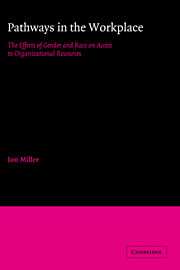1 - Rationality and equity in professional networks
Published online by Cambridge University Press: 30 September 2009
Summary
Few would doubt that race and gender have an influence on patterns of interaction in the workplace; but, as the discussion in this chapter will show, consensus has not been reached on just how such ascribed factors affect organizational activities. Some argue that organizations are essentially evenhanded in their treatment of different categories of personnel and that they do not add to the disadvantages that certain groups bear because of their location in systems of privilege and deprivation outside the organization. Others maintain that organizations duplicate and even intensify the patterns of advantage and disadvantage that exist externally. In the present investigation, the picture is further complicated because the organizations had some features that clearly worked against pronounced race and gender differences in work experiences, but other features that suggested that the competition for professional advantages and personal rewards was intense as well as uneven. I will review some of the important studies that deal with ascription in the area of work and then turn to a description of the rationalistic and nonrationalistic characteristics of the programs in the present study. The chapter concludes with an explanation of the measurement techniques and analytic strategies that were used.
Gender and race as factors in organizational stratification
The concept of rationality comes to us from Weber in several variations. It captures the shift from ascription to achievement in the allocation of positions and resources and from particularism to universalism in the evaluation of performance [cf. Parsons (1950, 1966); Kalberg (1980)]. Through this set of meanings, the term “rationality” is closely identified, historically and theoretically, with the increasing reliance on complex, bureaucratized forms of organization.
- Type
- Chapter
- Information
- Pathways in the WorkplaceThe Effects of Gender and Race on Access to Organizational Resources, pp. 8 - 26Publisher: Cambridge University PressPrint publication year: 1986



